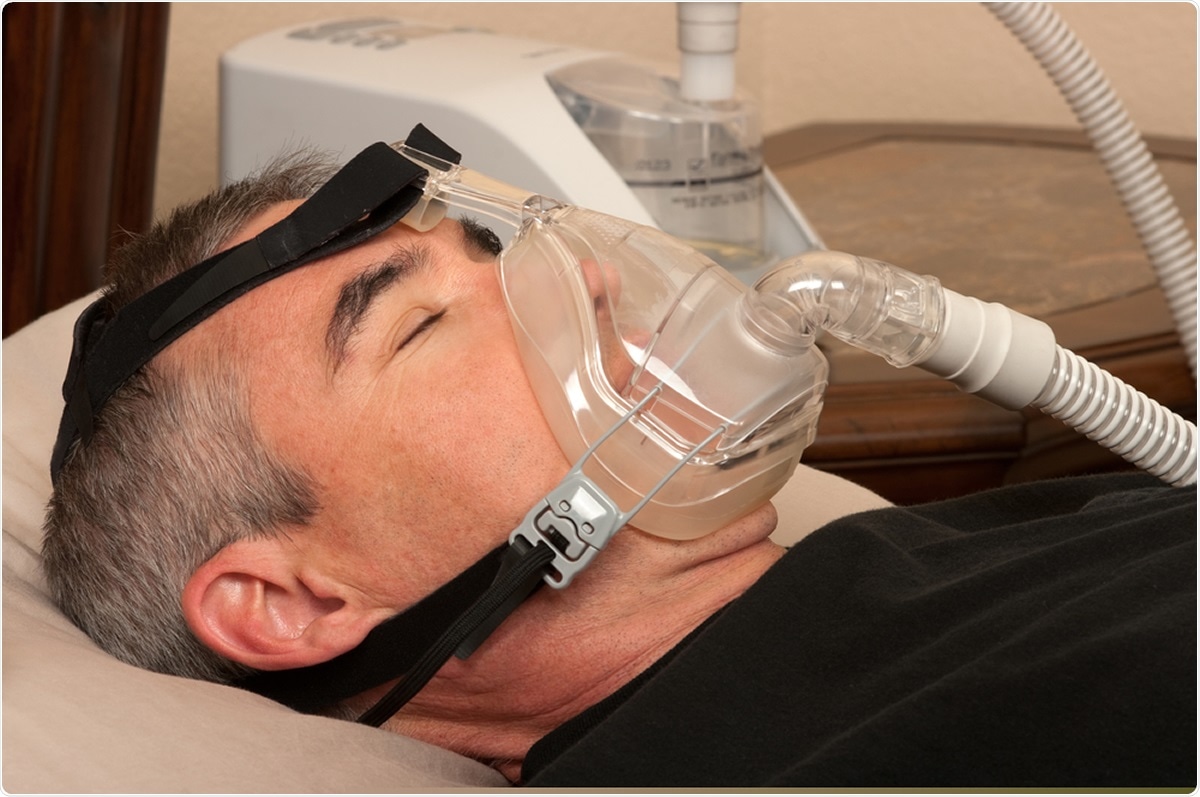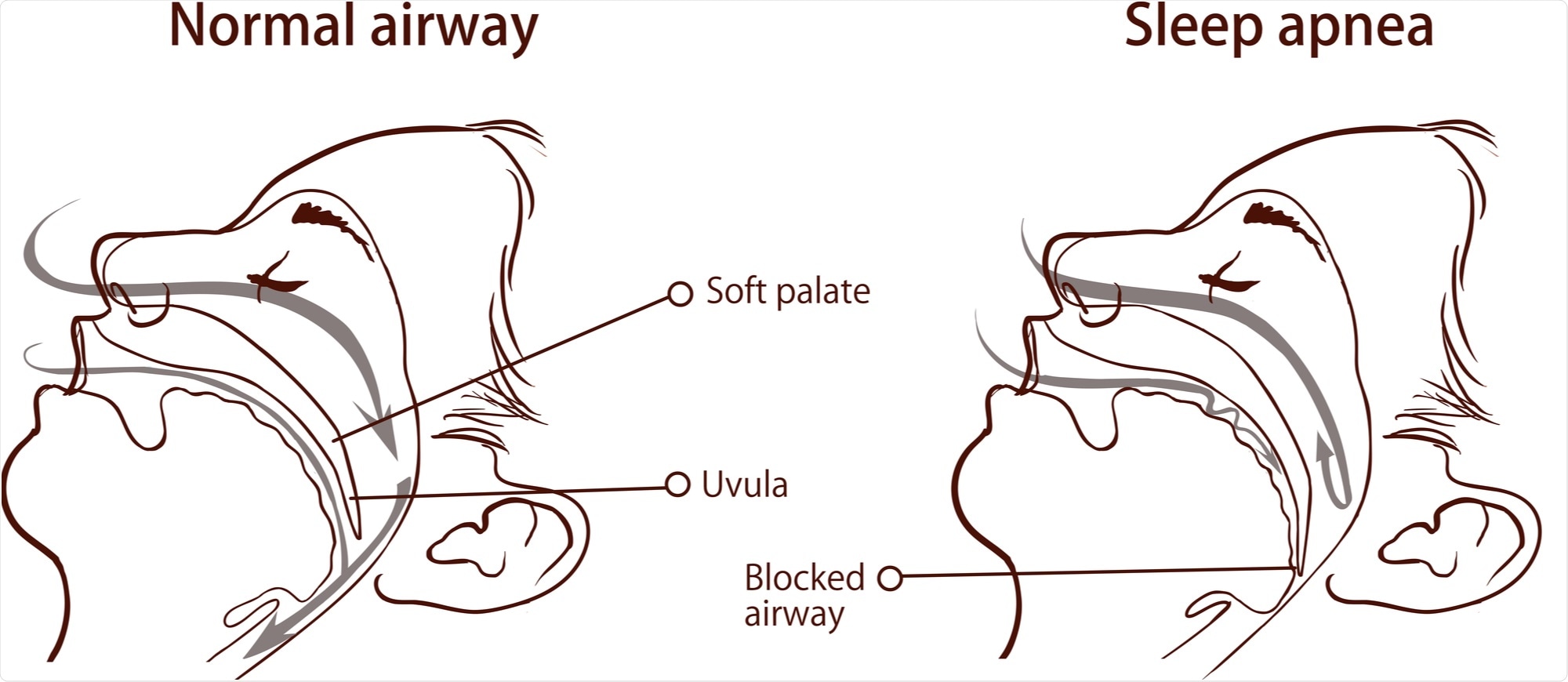Coronavirus disease (COVID-19) is a respiratory disease caused by severe acute respiratory syndrome coronavirus 2 (SARS-CoV-2) infection. A subset of COVID-19 patients face a severe form of the disease with hospitalization, respiratory failure, or death. Severe COVID-19 is primarily characterized by respiratory distress, and the common risk factors are older age, obesity, cardiovascular disease, diabetes, and poor lung function.
Three small studies reported that obstructive sleep apnea (OSA) might be a potential risk factor for severe COVID-19. OSA is a sleep disorder characterized by repetitive apnea-hypopnea cycles during sleep, which causes shortness of breath and can often lead to sleep disruption, severe oxygen desaturation, and an increase in systolic and diastolic blood pressure.

Study: Sleep apnoea is a risk factor for severe COVID-19. Image Credit: Brian Chase / Shutterstock

 This news article was a review of a preliminary scientific report that had not undergone peer-review at the time of publication. Since its initial publication, the scientific report has now been peer reviewed and accepted for publication in a Scientific Journal. Links to the preliminary and peer-reviewed reports are available in the Sources section at the bottom of this article. View Sources
This news article was a review of a preliminary scientific report that had not undergone peer-review at the time of publication. Since its initial publication, the scientific report has now been peer reviewed and accepted for publication in a Scientific Journal. Links to the preliminary and peer-reviewed reports are available in the Sources section at the bottom of this article. View Sources
The common risk factors for OSA are older age, obesity, male sex, and upper-airway structure anomalies. Since OSA affects nearly 8% of the population and has a higher prevalence of over 20% in individuals above 60 years, its association with the risk of severe COVID-19 infection leading to hospitalization is worrying.
That’s why a team of researchers from the University of Helsinki; Helsinki University Hospital; Broad Institute of MIT and Harvard; and Massachusetts General Hospital, Boston, MA, decided to build on those small studies and test the link between OSA and COVID-19 using a large-scale biobank with health data of patients.
Study focused on testing the link between OSA and COVID-19
In their recent preprint paper published on the medRxiv* server, the researchers discussed their study that aimed at testing the association between OSA diagnosis and risk of COVID-19 transmission and severity. They wanted to specifically evaluate if OSA increases the risk for severe COVID-19 infection independent of other common risk factors such as age, sex, hypertension, and diabetes.

Image Credit: corbac40 / Shutterstock
The key objective of the study was to investigate if OSA patients were at an elevated risk of contracting COVID-19 and developing the severe form of the disease leading to hospitalization. The team conducted a retrospective case-control study with the help of the FinnGen Study cohort, the National Infectious Diseases Registry, Finnish National Hospital Discharge Registry, and Causes of Death Registry.
Details of OSA diagnosis and infection with COVID-19 of 305 patients were gathered from the FinnGen study. All the patients tested RT-PCR positive for COVID-19 infection, and 26 (8.5%) of these patients also had OSA. Infections requiring hospitalization were considered as severe COVID-19. Among the severe COVID-19 patients, 16 (19.3%) individuals had OSA. Additionally, the team also analyzed other proven risk factors for both OSA and severe COVID-19 from the FinnGen data.
OSA is an independent risk factor for severe COVID-19
The results of the study showed that OSA patients with COVID-19 were at 5 times more risk of developing complications and being hospitalized. OSA is an independent risk factor for severe COVID-19 that requires hospitalization. It elevated the risk regardless of age, sex, hypertension, body mass index, diabetes, asthma, and chronic obstructive pulmonary disease, and coronary heart disease.
“Our findings are in line with the previous reports which have hypothesized the connection between OSA and COVID-19 as they share a number of comorbidities and risk factors”.
However, OSA was not associated with the risk of contracting COVID-19 infection.
Sleep apnea does not affect the risk of COVID-19 transmission
Based on the analysis done in this study, the researchers concluded that OSA patients have a 5-fold risk of being hospitalized when they have a COVID-19 infection compared to individuals without OSA. However, another key finding was that OSA patients are not at a higher risk of contracting COVID-19 infection than individuals without OSA.
The findings suggest that during the assessment of suspected or confirmed COVID-19 patients, OSA should be considered a comorbidity risk factor for developing a severe form of COVID-19. These findings agree with previous reports that suggested a connection between OSA and severe COVID-19 risk because they share many risk factors and comorbidities.
While previous reports suggested that men are at elevated risk of COVID-19, this study found that COVID-19 infection was more prevalent in women. Also, women with severe COVID-19 infection were older than men (women - 69.5 years and men - 61.9 years).
“Our findings should be interpreted in the context that registry-based ascertainment through hospitalization may miss non-hospitalized OSA cases (false negatives) and treatment information such as CPAP or MAD compliance.”

 This news article was a review of a preliminary scientific report that had not undergone peer-review at the time of publication. Since its initial publication, the scientific report has now been peer reviewed and accepted for publication in a Scientific Journal. Links to the preliminary and peer-reviewed reports are available in the Sources section at the bottom of this article. View Sources
This news article was a review of a preliminary scientific report that had not undergone peer-review at the time of publication. Since its initial publication, the scientific report has now been peer reviewed and accepted for publication in a Scientific Journal. Links to the preliminary and peer-reviewed reports are available in the Sources section at the bottom of this article. View Sources
Journal references:
- Preliminary scientific report.
Sleep apnoea is a risk factor for severe COVID-19 Satu Strausz, Tuomo Kiiskinen, Martin Broberg, Sanni Ruotsalainen, Jukka Koskela, Adel Bachour, Aarno Palotie, Tuula Palotie, Samuli Ripatti, Hanna M Ollila medRxiv 2020.09.26.20202051; doi: https://doi.org/10.1101/2020.09.26.20202051,
- Peer reviewed and published scientific report.
Strausz, Satu, Tuomo Kiiskinen, Martin Broberg, Sanni Ruotsalainen, Jukka Koskela, Adel Bachour, FinnGen, et al. 2021. “Sleep Apnoea Is a Risk Factor for Severe COVID-19.” BMJ Open Respiratory Research 8 (1): e000845. https://doi.org/10.1136/bmjresp-2020-000845. https://bmjopenrespres.bmj.com/content/8/1/e000845.